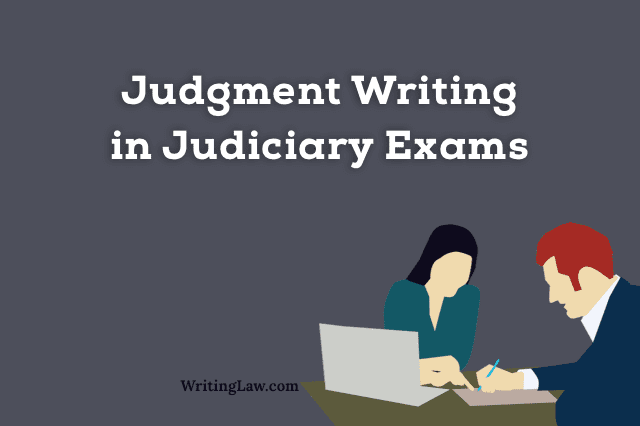
Judgment writing is an essential part of the judicial services examination. Be it civil judge junior division or higher judicial services, candidates preparing for judiciary exams face questions related to judgment writing.
1. What is Judgment?
2. Best Judgment Writing Tips For Judicial Services Exam
3. Judgment Writing Format (Civil and Criminal)
What is Judgment?
The term judgment is defined in section 2(9) of the Civil Procedure Code, 1908, as “the statement given by the judge on the grounds of a decree or order.”
It means that a judge delivers his judgment on the merits of the decree of a case.
A judgment in a case should be such that conclusively describes the rights and liabilities of the parties on the basis of the decree.
Best Judgment Writing Tips For Judicial Services Exam
The art of writing the best judgment comes from the clarity of legal provisions and principles. The better you understand the law, the brighter it reflects in your judgment.
Every judicial exam contains questions related to judgment writing. Therefore, you must learn the style, art, and format of writing a judgment. There are some minute differences in civil and criminal judgment writing. However, the essence of both is the same; that is, the law and its applicability.
Why You Should Learn Judgment Writing
Delivering judgment in an open court is the main task a judge performs while acting judicially. It is the judgment in a case that sets a precedent for subsequent similar circumstances.
Judgment writing is so important that even in judicial exams it carries a good weightage of marks. If you write it well, you can score excellent marks in the Mains examination. Beautiful judgment writing further leaves a good impression in the mind of the examiner.
What Is the Most Important Thing In Judgment Writing
The soul of judgment writing is the correct application of the law on given facts and circumstances.
The issues put before you in the exam paper examine your analytical skills that how you apply your mind to given facts and issues. Every student reads the law, but that is not enough. Knowing the crux of the law is what is required.
What Is the Format Of Judgment Writing
Candidates preparing for the judicial services exam often ask for the best format of judgment writing. As we mentioned earlier, it is not the best format, but the words written in judgment reflect the mind of a judge.
It is crucial that while giving judgment, a judge must go through all facts of the case. In criminal jurisprudence, it is said that judgment should be delivered beyond a reasonable doubt. This is the reason, the nib of the pen is broken after giving a death sentence so that it can never be used to do that again.
Judgment Writing Format (Civil and Criminal)
1. At the top of the page comes the name of the court in which the suit is being tried, and in brackets, the name of the presiding judge is written.
2. Then after it, on the left side, the civil suit number is written, and the year it started. In a criminal case, you write the charges under which a person is charged.
3. Then, leaving a space of a line, on the left side, you write the plaintiff’s details, such as name, residence, and occupation. In a criminal case, you write the state of XYZ as the state is a prosecutor in a criminal case.
4. Then below it, putting the abbreviation of versus (vs.) in between, comes the details of the defendant, such as name, residence, and occupation. In criminal cases comes the details of the defendant.
5. After writing details, in the centre, you write in bold the word ‘JUDGMENT‘ and in brackets the date of judgment. Same in a criminal case.
6. Then comes the body of the judgment. The first paragraph should contain the nature of the suit.
7. The subsequent paragraph should contain the facts admitted by parties and, in a criminal case, if the accused has given any statement or confession, if any.
8. Then, in brief, the case of the plaintiff and defendant should be written concisely.
9. After it, the issues and findings, points of determination have to be written. The issues can be written like issue 1, issue 2, and likewise.
10. The description of pieces of evidence taken, findings, reasons of findings, and their significance for the case, everything must be stated.
11. If it is a property suit, then it should contain a description of the property as well. In a criminal case, the description of weapons is to be written, if any, discovered or seized.
12. The judgment should be specific and must not contain any ambiguity.
13. Every page of judgment is to be signed by the judge. It should contain the seal of the court and the designation of the judge.
Note: The judgment writing in civil and criminal differs. The format slightly changes. But the format mentioned above clearly gives you a description as to how to write the best judgment.
Some of the changes are that, in place of a civil suit number, in criminal cases, charges are written, and at the end of the judgment, liability and punishment are imposed on the accused. Whereas in civil suits, fine, specific performance, and damages are imposed on the defendant or judgment debtor.
Helpful External Resources:
- Sample of a Civil Judgment Writing: Sonia Mehra vs. Manisha Rawat – Courtesy of Legit Quest
- Sample of a Criminal Judgment Writing: State of Maharashtra vs. Suresh s.o Tukaram Waghade & Others – Courtesy of Legit Quest
- 7 Steps to Clearer Judgment Writing: Courtesy of Maharashtra Judicial Academy
- 18 Most Important Amendments to the Indian Constitution - 12th August 2023
- 8 Kinds and Theories of Punishment - 22nd July 2023
- What Is the Meaning of Res Judicata in Civil Procedure Code? - 22nd January 2023







